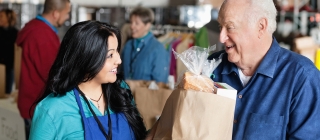Addressing the Health Impact of Food and Housing Insecurity in Vermont

Having access to food and housing is fundamental for our wellbeing. In this blog, we discuss the health impacts of Vermont's food and housing insecurity crises, resources, and more.
Food and housing insecurity are health crises being faced by many of our neighbors. In a state as beautiful and community driven as Vermont, it’s hard to believe that so many of its residents are experiencing such harsh realities.
According to a 2023 report released by the U.S. Department of Housing and Urban Development, Vermont has the second highest per-capita rate of homelessness of any state in the country.
Similarly appalling statistics exist for food insecurity in Vermont. According to Hunger Free Vermont, two in five Vermonters are currently experiencing hunger.
The Health Impact of Food and Housing Insecurity
Food and housing insecurity can have a devastating impact on a person's health.
When individuals lack consistent access to nutritious food, their physical well-being is compromised. Chronic conditions such as diabetes, obesity, and heart disease become more prevalent, as do mental health conditions like depression and anxiety. Similarly, the stress and instability associated with housing insecurity take a toll on both mental and physical health by exacerbating existing conditions and weakening the immune system.
Health outcomes are shaped by many factors, including social determinants such as income, education, and access to resources. In Vermont, where the cost of living can be high, many individuals and families find themselves forced to make difficult choices between paying for housing or putting food on the table. This balancing act not only compromises their immediate well-being, but also perpetuates cycles of poverty and inequity.
Raising Awareness and Spurring Action
Recently, we had the opportunity to speak with Bess O'Brien, a filmmaker deeply immersed in capturing human stories. Her latest documentary Just Getting By is a sweeping, yet intimate, look at the lives of Vermonters who are struggling with food and housing insecurity. We’re sponsoring the upcoming screening tour of the film.
Bess shares that she was inspired to make this film simply because she was interested in exploring the daily lives of people facing these challenges. “I was lucky to find amazing people who wanted to tell their stories,” she says. She further describes her collaborators as resilient, innovative, and strong.
“Bess O’Brien is a master at pulling light toward the often-overlooked corners of our society, and giving a voice to those lived experiences,” shares Megan Peek, director of Community Relations & Health Promotion at Blue Cross Vermont.
Just Getting By tells the stories of working families, folks who are homeless and are accessing food shelves and soup kitchens, people living in the temporary hotel/motel program, New Americans grappling with the cost of living in America, Native people creating innovative farming practices, and folks on the ground providing services to their fellow Vermonters in need.
Bess’ documentary serves as a catalyst for conversation, compassion, and action.
"As we tour the movie across Vermont from March 22 thru April 12, I hope audience members will be part of a statewide conversation about these important issues,” Bess shares. She encourages viewers to greet each other with dignity, advocate for supportive initiatives in their communities, and engage with policymakers to effect systemic change.
Join us at a screening of Just Getting By near you.
Resources for Vermonters
Solving food and housing insecurity requires a multifaceted approach that includes strengthening Vermont agriculture, increasing livable wage jobs, investing in housing infrastructure and public transportation, and more. While finding definite solutions is not a simple task, many organizations are working to support our communities with programs and resources.
The state’s largest hunger-relief organization, The Vermont Foodbank, is heavily featured in the Just Getting By film. They work to provide nutritious food through a network of more than 300 community partners, including food shelves, meal sites, senior centers, after-school programs, schools, and hospitals.
The Vermont Foodbank is an organization we consistently support through food drives, Blue Crew volunteer hours, and more. With the help of our community, last year we were able to donate 1,429 pounds of apples to the foodbank during our annual Apple Days event!
Whether you’re looking for resources or to support a food or housing-related mission, find a handful of examples of additional local organizations below.
Food-focused organizations:
Housing-focused organizations:



